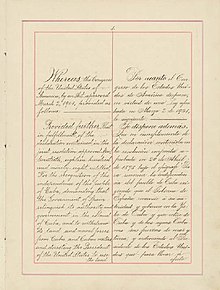Platt Amendment
The Platt Amendment was a bill passed by the United States Congress on March 2, 1901, formally as an amendment to the United States Army Appropriations Act, hence the official name of the bill: An Act Making appropriation for the support of the Army for the fiscal year ending June thirtieth, nineteen hundred and two ("An Act to provide for the support of the Army for the fiscal year ending June 13, 1902"). Secretary of War Elihu Root had drafted the amendment; it was named for Senator Orville H. Platt of Connecticut, who presented it to the Senate. The Platt Amendment was intended to regulate the terms of the withdrawal of American troops from Cuba and Cuban-American relations after Cuba had been occupied by the United States in the Spanish-American War of 1898.
Under pressure from the U.S. government, the Platt Amendment was added to Cuba's constitution as an amendment (English amendment; Spanish enmienda). The Constituent Assembly of Cuba rejected the Platt Amendment in the first vote by 24:2. After a visit to Washington, the vote of an amended interpretation of the treaty still resulted in a 15-14 vote. Only the third vote on June 12, 1901, resulted in 16:11 votes for the original version, after the USA had threatened to occupy Cuba until a government accepted the Platt Amendment.
The Amendment was verified in a treaty between the United States and Cuba in 1903/04. The core point is "the right of the United States to intervene in Cuba, for the preservation of Cuban independence, for the maintenance of government, guaranteeing the protection of life, property, and individual liberty" (Article III). Furthermore, the Platt Amendment, in Article VII, establishes the right of the United States to "buy or lease" tracts of land from Cuba and use them as naval bases. Indeed, the United States intervened several times in Cuban history to secure its national and economic interests; for example, it deposed Cuban President Ramón Grau San Martín in 1934.
The treaty was abrogated in May 1934 under the Good Neighbor Policy of U.S. President Franklin D. Roosevelt. Roosevelt, while retaining Section VII, the abolition of which would have endangered the existence of the American naval base at Guantánamo Bay.

Orville H. Platt

First page of the Platt Amendment
Search within the encyclopedia